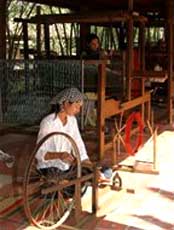Nguyen Thi Doan from the northern province of Phu Tho is every day wrapped up in weaving bamboo shades at Mot Thoang Vietnam, or A Glimpse of Vietnam, in HCMC’s Cu Chi District, and sitting nearby is her uncle Nguyen Xuan Hai, who makes rattan screens.
 |
| Cham lasses spin thread and weave cloth of their style |
Doan and Hai are among the craft persons who have traveled tens to thousands of kilometers from the Mekong Delta, the Central Highlands and the north of Vietnam to the cultural and craft village site in the outlying district to demonstrate diverse ways of making typical handicrafts of the country.
Doan, Hai and other craft persons are doing their jobs at Mot Thoang Vietnam to make items for sale and more importantly to provide visitors a window into how craft villages across Vietnam are using the materials they produce and the harvest from their farms or forests to make simple but eye-catching handicrafts for daily use.
This is the purpose of Mot Thoang Vietnam’s existence. Now, foreign tourists and students may not have to book tours or field trips to craft villages around Vietnam to observe on-the-spot how craft persons weave tho cam (ethnic brocade fiber), carve wooden logs into wonders and weave rattan into home appliances. Mot Thoang Vietnam can satisfy their need to know what many of Vietnam’s traditional craft villages are like.
The quarter of craft villages at Mot Thoang Vietnam is quiet, but not boring as craft persons chat amidst the clacking sound of wooden cudgels hitting a chisel caused by a sculptor or a loom used for weaving cloth.
Sitting a little far from the sculptor and the weaver are the craftsmen and women in their simple but unique attire making giay gio (poonah paper) and inlaid gold-leaf items, doing the embroidery and the farming.
Tran Thi Tuyet Nga, who initiated the Mot Thoang Vietnam project, says that in addition to more than ten traditional Vietnamese crafts the site will admit more people who can learn how to grow organic vegetables and fruits after the grand opening of the cultural and craft village park.
The vegetables and fruits will be used as basic ingredients for authentic Vietnamese dishes of different regions for guests to taste during their stay at Mot Thoang Vietnam, which is more than 50 kilometers from downtown HCMC and near the renowned tourist site Cu Chi Tunnels.
Now, visitors can see gourd, pumpkin and muop (poopah) plants laden with fruits at Mot Thoang Vietnam, and they can have these vegetables cooked to order for lunch after a trip around the craft quarter. Breezes make their ways through lines of bamboo trees and canals, refreshing diners before they enjoy the meal.
At the craft village quarter, items are on display for visitors to admire and scrutinize before they decide to buy one or more to have something to remember the destination and Vietnam.
Nga says Mot Thoang Vietnam is being developed into a destination where both Vietnamese and foreign visitors can feel and learn something about the life and cultural attractions of the country through the craft villages, folk games and other experiences.
Mot Thoang Vietnam is located at Phu Binh Village, An Phu Commune, Cu Chi District, HCMC. For more information, call 08 2218 1465 or email langnghemtvn@gmail.com.